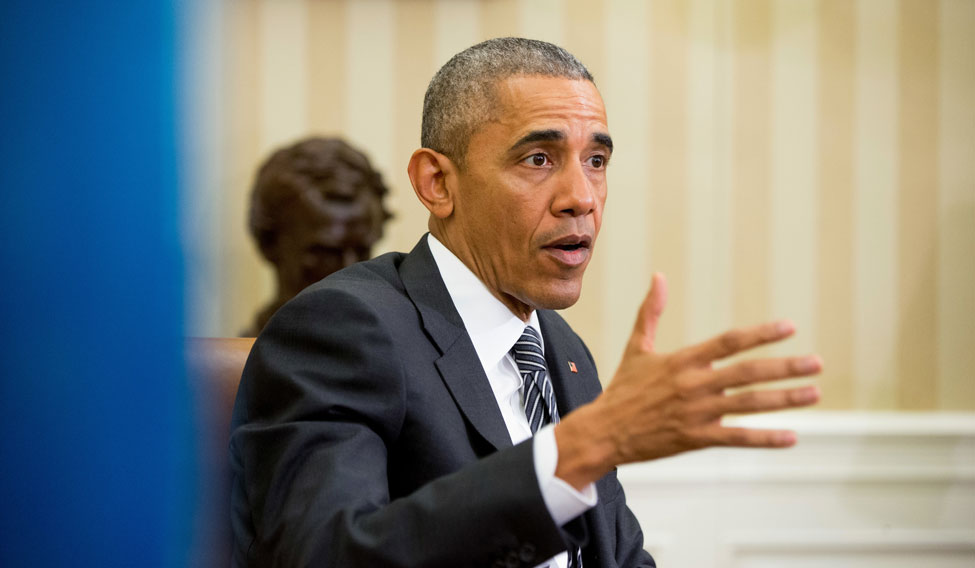US President Barack Obama on Monday confirmed the death of Taliban chief Mullah Akhtar Mansour, two days after a US drone struck at a vehicle the militant leader was riding in Pakistan's Balochistan province.
Obama's statement, released by the White House, comes when Pakistan has remained vague about the identity of the two people killed in Saturday's US drone strike.
Pakistan's Prime Minister Nawaz Sharif even late on Sunday said it was still not confirmed that Afghan Taliban leader Mansour was killed.
Speaking to media on arrival in London, Sharif said he had received a phone call from US Secretary of State John Kerry informing him about the attack. Sharif, however, said the two bodies were disfigured beyond recognition and he could not confirm Mansour's death.
Obama, who is in Vietnam, said Mansour's death marks an "important milestone" in the long-standing effort to bring peace in Afghanistan.
The statement said: "Mansour's death removes the leader of an organisation that has continued to plot and unleash attacks on US and has waged war against the Afghan people."
Obama said the US will continue to take action against extremist networks that target the US and coalition forces.
"We will work on shared objectives with Pakistan, where terrorists that threaten all our nations must be denied safe haven. After so many years of conflict, today gives the people of Afghanistan and the region a chance at a different, better future."
"Mansour rejected efforts by the Afghan government to engage in peace talks and end the violence in the South Asian nation," the US president said.
The violence led by the militant group has taken the lives of countless innocent Afghan men, women and children, he said.
"The Taliban should seize the opportunity to pursue the only real path for ending this long conflict -- joining the Afghan government in a reconciliation process that leads to lasting peace and stability," Obama said.
Obama also said that the US will continue helping Afghan security forces and support President Ashraf Ghani in his efforts to forge the peace and progress that Afghan people deserve.
He said the US military has sent a clear message to all those who target the US people and its coalition forces.
John Kerry on Saturday informed the Afghan and Pakistan governments of the strike, authorised by Obama, targeting Mansour in the Pakistan-Afghan border town of Ahmad Wal, near Quetta.
Kerry said Mansour had posed "a continuing, imminent threat to US personnel".
He also said the air strike sent "a clear message to the world that we will continue to stand with our Afghan partners".
NATO Secretary General Jens Stoltenberg said Mansour's death created an opportunity for progress towards peace in Afghanistan.
The Taliban leader's actions had led "to the death and suffering of countless Afghan civilians and security forces", he said in a statement.
Mansour took control of the group in July last year after the announcement of the death of Taliban's former leader Mullah Omar two years earlier.
The killing of the Taliban leader is likely to have major ramifications both for efforts to kickstart peace talks and for the often stormy relationship between the US and Pakistan.
Mansour's death came days after diplomats from Pakistan, Afghanistan, US and China held the latest round of talks in Islamabad about a flagging effort to draw the Taliban into peace negotiations.
His death would be a big blow for the Taliban as Mansour was gradually tightening his grip on the movement by bringing into his fold other leading Taliban members, including a son and a brother of his predecessor Mullah Omar, and by launching large scale attacks on Afghan security forces.
A vacuum created by his death would once again trigger a leadership struggle, observers opined.
The top Taliban leaders reportedly met on Sunday in the framework of their leadership council to discuss the successor of Mansour.
The leadership council discussed regarding various possible successors, including the notorious guerrilla commander Sirajuddin Haqqani.
Haqqani is the leader of the notorious Haqqani terrorist network and he reportedly played a key role in resolving the Taliban leadership issues following the confirmation of Mullah Mohammad Omar's death.
According to sources, Taliban were also considering Mullah Yaqoob, the son of Mullah Omar, a potential unifier because of his father's name.
However, the Taliban group has not issued any official statement confirming Mansour's death.




